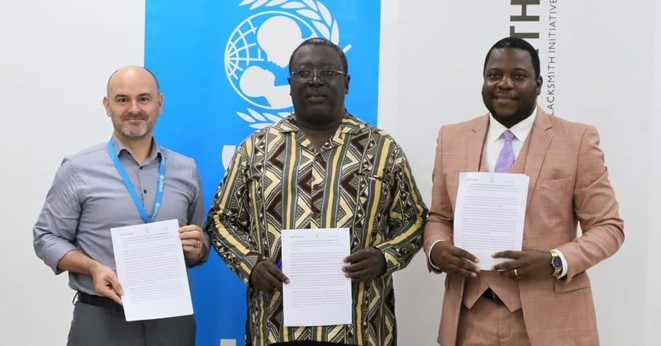This declaration of national action against lead poisoning, upon convening on 24th August 2023, is pronounced by Blacksmith Initiative/Pure Earth Ghana, UNICEF, and the Ghana Health Service
WHEREAS lead is a toxic heavy metal that can cause irreversible harm to children’s development, primarily their intellectual potential and behavior; There is no known safe blood lead concentration and even concentrations as low as 3.5 ug/dL may be associated with decreased intelligence, behavioural difficulties, and learning problems in children.
WHEREAS the parties above conducted a survey across the three ecological zones of Ghana to compare blood lead levels (BLL) in Ghanaian children aged 12—59 months and living near hotspots of lead contamination, with those living in areas devoid of such hotspots; and home-based assessments (HBAs) to identify sources of lead exposure within the home environment.
WHEREAS this project generated evidence of widespread lead exposure and poisoning among the children under study. This included areas of very high, localized exposure in Greater Accra and areas of widespread elevated background exposure in the Northern Region.

The BLI- study found that out of 3,227 children tested, 1,725 (53.5%) had levels at 5 micrograms per decilitre (ug/dL) or above, which is the level at which the World Health Organization (WHO) recommends public health action to reduce or eliminate exposure.
WHEREAS elevated blood lead levels appear to be driven by both industrial sources as well as certain consumer products, with significant variation across the study areas. The I-IBA study found household dust, soil, Chilo (a traditional eyeliner applied to children), and locally fabricated metal cookware to be important sources of lead exposure.
Lead pollution from industrial sources was reflected in elevated concentrations in the blood of children living nearby (including extreme levels above 45 micrograms per decilitre), and elevated concentrations in soils and dust from nearby homes.
WHEREAS human exposure to lead from Used Lead Acid Battery (ULAB) recycling and other leadrelated industries present a public health emergency, that requires urgent public health action to end the exposure.
WHEREAS the use of the traditional eyeliner, Chilo, on children was found to be very prevalent in the Northern Region. Most mothers applied Chilo on the children assessed in Yendi and Tolon. 93% of the Chilo samples that were tested, all exceeded the Ghana Standards Authority threshold of lead in cosmetics, and some were composed entirely of lead, posing a significant source of lead exposure to children. This type of eyeliner appears to be imported.
WHEREAS metal cookware, particularly affordable, locally fabricated aluminum cookware (Dadesen), have been found to contain lead which can leach into the food being cooked.
77% of the cooking pots assessed during the study were found to contain levels of lead high enough to indicate the potential for a dangerous amount of lead to leach.
Metal cookware items with elevated lead were found in all study areas, with the highest proportion in the Northern Region.
THEREFORE, we recommend the following actions to reduce the exposure of children to the harmful effects of lead poisoning.
Recommendations
As a matter of urgency, the following should immediately be attended to:
- A high-level, multi-sector government lead reduction program will be established with the support of Pure Earth and UNICEF to be led by the Ministry of Environment and the Ministry of Health.
- A nationally representative lead poisoning prevalence survey among children will be required to identify hotspots of lead exposure across the country.
- Systematic surveillance of blood lead levels may be required in areas of high exposure risk to identify children with elevated blood lead levels and ensure exposure reduction and medical treatment is provided as needed.
- Results of this study can be used to inform future investigations into the prevalence of elevated blood lead levels and potential sources in additional regions in Ghana.
- Lead-contaminated sites should be identified, characterized, and prioritized for intervention.
- Urgent action should be taken to eliminate polluting sources of Used Lead Acid Battery (ULABs) recycling industries across the country, especially those located in residential areas, and remediate the associated contaminated sites.
- Health surveillance measures should be instituted as a matter of urgency for individuals working in formal UI-AB factories. This group is not only susceptible to lead poisoning themselves but may also play a significant role in exposing children in their communities to lead.
- The Environmental Protection Agency (EPA) should as a matter of urgency take all the necessary steps to review the permitting conditions for existing and proposed formal Used Lead Acid Battery (ULABs) recycling industries and stop the activities of informal ULABs in Ghana.
- Public risk communication to relevant communities in the study areas is needed around the sources of contamination identified in the Home-Based Assessments.
- The Ghana Standards Authority should ensure that only safe eyeliner products are available to consumers for purchase.
- The Ghana Standard Authority should put together requisite standards to regulate the toxic metal content in traditional aluminum cookware (Dadesen) in Ghana.
The declaration was witnessed by representatives of the parties who affixed their signatures below:











